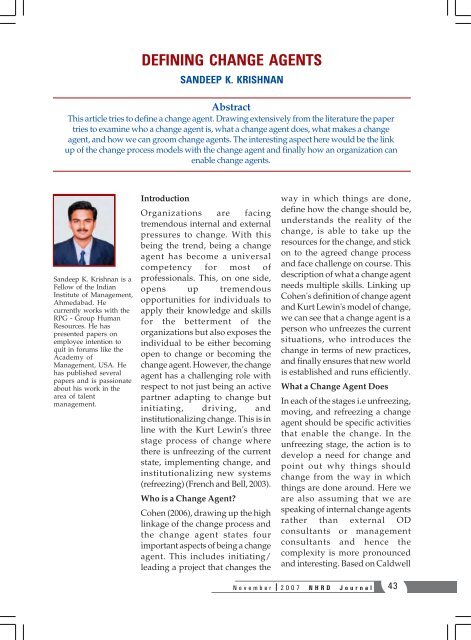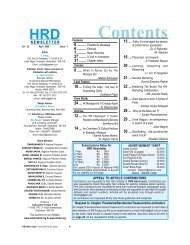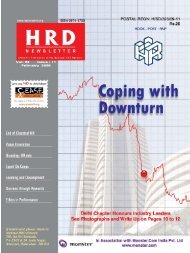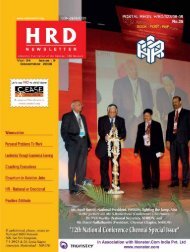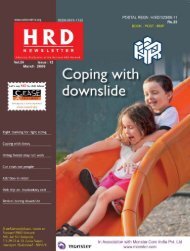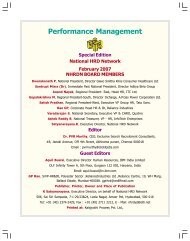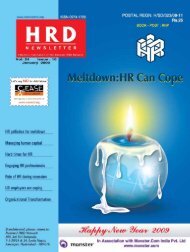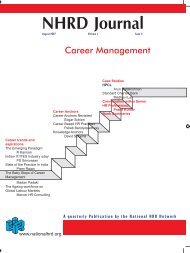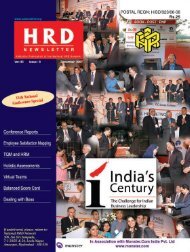NHRD Journal - National HRD Network
NHRD Journal - National HRD Network
NHRD Journal - National HRD Network
You also want an ePaper? Increase the reach of your titles
YUMPU automatically turns print PDFs into web optimized ePapers that Google loves.
DEFINING CHANGE AGENTS<br />
SANDEEP K. KRISHNAN<br />
Abstract<br />
This article tries to define a change agent. Drawing extensively from the literature the paper<br />
tries to examine who a change agent is, what a change agent does, what makes a change<br />
agent, and how we can groom change agents. The interesting aspect here would be the link<br />
up of the change process models with the change agent and finally how an organization can<br />
enable change agents.<br />
Sandeep K. Krishnan is a<br />
Fellow of the Indian<br />
Institute of Management,<br />
Ahmedabad. He<br />
currently works with the<br />
RPG - Group Human<br />
Resources. He has<br />
presented papers on<br />
employee intention to<br />
quit in forums like the<br />
Academy of<br />
Management, USA. He<br />
has published several<br />
papers and is passionate<br />
about his work in the<br />
area of talent<br />
management.<br />
Introduction<br />
Organizations are facing<br />
tremendous internal and external<br />
pressures to change. With this<br />
being the trend, being a change<br />
agent has become a universal<br />
competency for most of<br />
professionals. This, on one side,<br />
opens up tremendous<br />
opportunities for individuals to<br />
apply their knowledge and skills<br />
for the betterment of the<br />
organizations but also exposes the<br />
individual to be either becoming<br />
open to change or becoming the<br />
change agent. However, the change<br />
agent has a challenging role with<br />
respect to not just being an active<br />
partner adapting to change but<br />
initiating, driving, and<br />
institutionalizing change. This is in<br />
line with the Kurt Lewin's three<br />
stage process of change where<br />
there is unfreezing of the current<br />
state, implementing change, and<br />
institutionalizing new systems<br />
(refreezing) (French and Bell, 2003).<br />
Who is a Change Agent?<br />
Cohen (2006), drawing up the high<br />
linkage of the change process and<br />
the change agent states four<br />
important aspects of being a change<br />
agent. This includes initiating/<br />
leading a project that changes the<br />
way in which things are done,<br />
define how the change should be,<br />
understands the reality of the<br />
change, is able to take up the<br />
resources for the change, and stick<br />
on to the agreed change process<br />
and face challenge on course. This<br />
description of what a change agent<br />
needs multiple skills. Linking up<br />
Cohen's definition of change agent<br />
and Kurt Lewin's model of change,<br />
we can see that a change agent is a<br />
person who unfreezes the current<br />
situations, who introduces the<br />
change in terms of new practices,<br />
and finally ensures that new world<br />
is established and runs efficiently.<br />
What a Change Agent Does<br />
In each of the stages i.e unfreezing,<br />
moving, and refreezing a change<br />
agent should be specific activities<br />
that enable the change. In the<br />
unfreezing stage, the action is to<br />
develop a need for change and<br />
point out why things should<br />
change from the way in which<br />
things are done around. Here we<br />
are also assuming that we are<br />
speaking of internal change agents<br />
rather than external OD<br />
consultants or management<br />
consultants and hence the<br />
complexity is more pronounced<br />
and interesting. Based on Caldwell<br />
November 2007 <strong>N<strong>HRD</strong></strong> <strong>Journal</strong> 43


